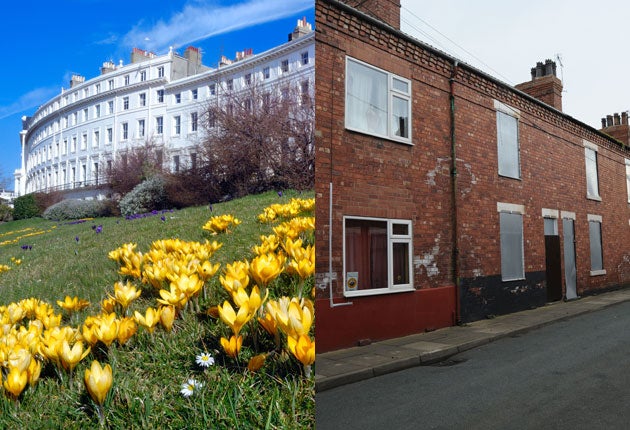Gulf between rich and poor cities widens
Hull suffers most from effects of recession, while Brighton set for swift recovery

Your support helps us to tell the story
From reproductive rights to climate change to Big Tech, The Independent is on the ground when the story is developing. Whether it's investigating the financials of Elon Musk's pro-Trump PAC or producing our latest documentary, 'The A Word', which shines a light on the American women fighting for reproductive rights, we know how important it is to parse out the facts from the messaging.
At such a critical moment in US history, we need reporters on the ground. Your donation allows us to keep sending journalists to speak to both sides of the story.
The Independent is trusted by Americans across the entire political spectrum. And unlike many other quality news outlets, we choose not to lock Americans out of our reporting and analysis with paywalls. We believe quality journalism should be available to everyone, paid for by those who can afford it.
Your support makes all the difference.Brighton has been tipped as one of the cities best placed to rise from the ashes of the recession; Hull is likely to be one of the last to recover. The South Coast city, known as the gay capital of Britain, is blessed with a highly educated workforce, entrepreneurship and a strong private sector that will drive its recovery.
But Hull has suffered the biggest increase in unemployment compared to other cities and is weighed down by a legacy of low skills and economic isolation, a report shows.
The comparative prospects of Hull and Brighton highlight the widening economic chasm between the country's cities caused by the recession. Hull has 16 jobseekers for every vacancy and suffered the biggest increase in youth unemployment; in Brighton a third of the workforce is graduate level and 20,000 new jobs have been added in the past decade.
Stoke, Burnley, Barnsley, Newport and Doncaster were named alongside Hull as the cities most likely to suffer the longest from the economic downturn. In contrast, Edinburgh, Milton Keynes, Reading and Cambridge were ranked with Brighton as "the ones to watch" because they have "the right ingredients to succeed", the Cities Outlook 2010 report found.
"We face an uneven recovery," said Dermot Finch, chief executive of the Centre for Cities, the research organisation that published the report. "The national economy may be emerging from recession but cities like Brighton are likely to recover more strongly than the likes of Barnsley.
"Party leaders need to wake up to the reality that some cities will still feel in the middle of a recession until well after the election. The next government needs to help these struggling cities fix the basics."
By tracking the progress of the recession in 64 cities the authors identified the widening gap between places such as Birmingham and Cambridge or Aberdeen and Rochdale. They found that while all have been hit hard by the recession, there is a disparity to be addressed. The report went on: "The difference between the highest and lowest 10 cities in terms of their [job seeker allowance] claimant count has widened by 70 per cent since the start of the recession." With 39 per cent of all jobs based in just five cities – London, Manchester, Birmingham, Leeds and Liverpool – the role of cities was described as "critical" to the recovery.
Join our commenting forum
Join thought-provoking conversations, follow other Independent readers and see their replies
Comments